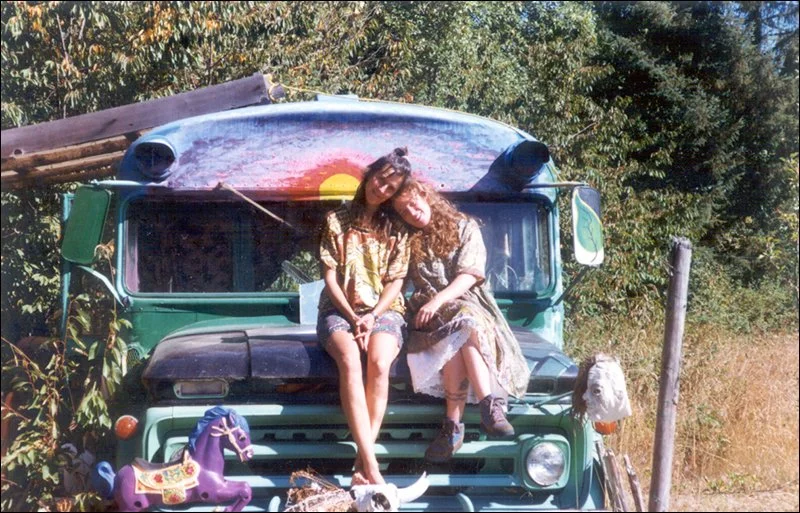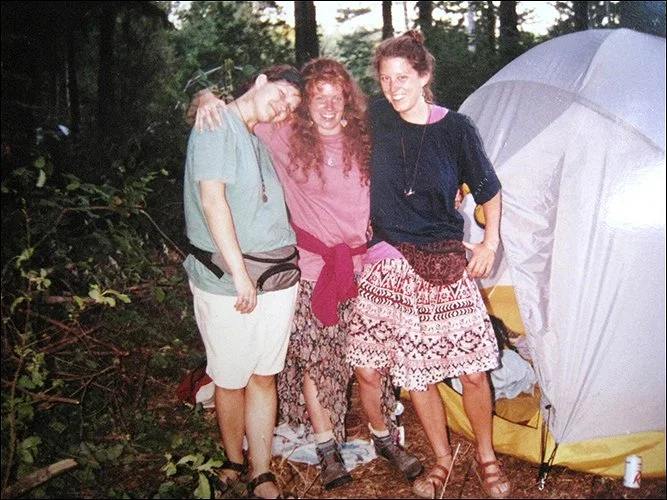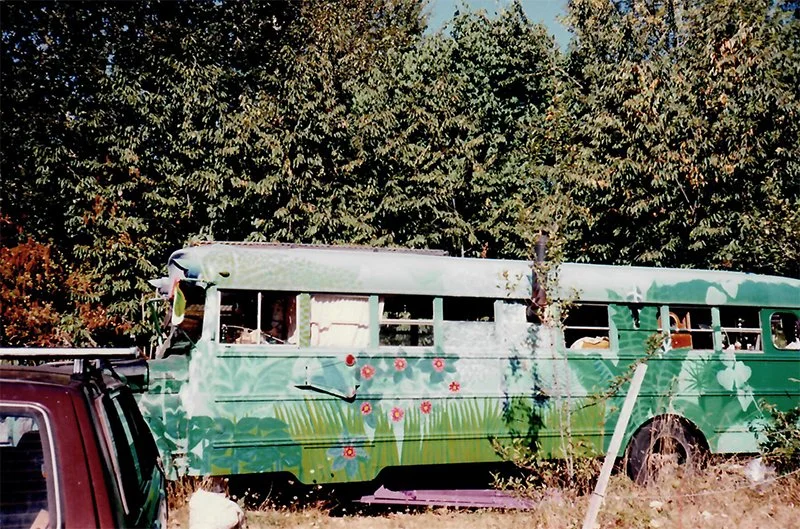Strangers for Ancestors #6: Living On & Off the Grid in Oregon
Alicia and Megan, Dexter, Oregon at Alicia’s bus, 1990
This week’s Stranger’s for Ancestors circles back to my life in Oregon after I’d left Montana to study at the University of Oregon in Eugene. As I’ve been writing about my family’s early history on this stolen land we now call ‘America’, I realize it’s important to include the acts and experiences of resistance and resilience as critical elements to my family’s American story.
As I’d previously written about in Strangers for Ancestors #2, moving out of Montana to Oregon was a life changing experience for me. I was finally able to breath and have the opportunity to learn more about who I was, in part because I stopped drinking as heavily as I had been (I’ve now been sober almost 14 years and will write more about that struggle in another post). In Oregon I was introduced to new experiences and knowledge, giving me a different lens to see the world through.
I chose the University of Oregon because one of my close friends, Kim was already at U of O, and her sister Alisa who was also a good friend was planning to transfer from University of Montana. We had all gone to the same high school; however, they were a year and two years behind me. I had been introduced to Kim and Alisa through a close friend in my class, Tina, who lived in Lockwood with them. Lockwood is a small (6,000+ pop.) suburb of Billings that borders the Crow/Apsáalooke reservation and was named after a ‘Captain Lockwood’, who was considered to be “successful” in helping to lead acts of genocide against the Indigenous Crow/Apsáalooke peoples. Tina and her older brother were adopted as unrelated (biologically) Native children by a working-class white couple; and while Tina loved her parents, it was a complicated upbringing that left her with a lot of questions, especially living right next to the reservation. Tina’s family lived on the plains of Lockwood in an old farmhouse, while Kim and Alisa’s lived in the pine hills. I first met Kim at Tina’s when she would come over to sunbathe with us on Tina’s roof; we became closer the summer following my senior year when we both had second jobs working at the Rimrock Mall.
Kim, Megan, Alisa at the Oregon Country Fair, 1990
Like Colleen and Ellen, my two closest friends at the time who were also sisters, Kim and Alisa came from a tight knit family. They and their parents had moved to Montana from Cincinnati, Ohio when Kim and Alisa were in grade school. Their parents did yoga, smoked pot, and listened to Bob Dylan. To this day, Kim loves to tell the story of me looking through their parents’ record albums and asking, “Who is this Bob Die-lan that your mom and dad have so much of?” Their family would take trips to California and they’d come back with mixed tapes made from KROQ and KNAC that played Punk and New Wave.
Spending time with Kim and Alisa was also my introduction to getting together with friends on the weekends and not drinking. Kim and I would get off work from the mall at 9 and we’d drive out to their home in the piney hills of Lockwood to spend the night with Alisa and maybe their parents, making vegetable stir fry and watching movies with pints of Baskin Robbins that Kim got to take home for free. Nights like this were as foreign to me as Bob Dylan and X at the time. That’s not to say we didn’t party and get wasted together, we did, but my high school scene had been more about going out to the rollerskating rink or to the dance club that was open to teens on Thursday nights called The Praire, getting drunk, and listening to Prince, Rufus & Chaka Khan, and Skyy. On some level I knew those nights at Kim and Alisa’s without alcohol were so much better for me and it felt good not to wakeup with a hangover, however, my addiction to alcohol had taken the place of my dysfunctional family and it was the space that I would go to feel, yet be numb.
When I moved to Eugene in the summer of 1988, Kim had found a huge 5-bedroom house with a loft, finished basement, and swimming pool on Mill Street at 12th, not far from campus for $800/month. The house had been a Buddhist Temple and belonged to an older hippie woman named Sarah who Kim had met while working at the Hilyard Market & Deli. Seven of us would end up moving in together. The place came with a hippie pool cleaner who came weekly, and the only room we were told we couldn’t paint was one that had been the meditation space for the Temple and had a blue ceiling.
My first weekend in Eugene was 4th of July 1988; Kim and I went to a party out at Ken Kesey’s property at Lost Creek, Dexter, Oregon. Kim’s friend Sarah (different from our landlady), who she worked with at the Hilyard Street Market had been a part of the Kesey inner circle since childhood and she invited us to go with her and her boyfriend. It was the perfect preface to the next five years of my life.
I lived in Eugene 1988 - 1992 and received my undergrad degree at the University of Oregon; though, I wasn’t really part of the college scene, other than many long nights in the printmaking studio. True to that first 4th of July weekend, mine was the alternative, underground community of herbalists, craftspeople, musicians, organic farmers, and activists. And even that ranged vastly -- from other college students like me who were drawn to an alternative way of seeing the world and living, yet still had a toe in mainstream culture - to folks who were so completely off the grid, living under the radar and off the land, or in vehicles, and for the most part, undetected.
Nevada Nuclear Test Site Protest, Mercury, Nevada, 1991
My real introduction into this surreal world was working at the Butte Tavern, a seedy, blue collar (timber and mill workers), on the "wrong-side of the tracks" bar in south Eugene. The place was a large windowless cement box with two pool tables, dart boards (teams for both), and ‘Blues on Thursdays’. I REALLY needed a job and I saw an ad in the paper looking for a bartender. I went to apply.
It was around 7pm, I walked through the door and was hit with a cloud of cigarette smoke. A bunch of long-haired hippie biker types, including the two bartenders all turned and looked at me like I must be lost; an apt assessment as I was a young, wide-eyed college student dressed as if I were going to an interview for an upscale venue (I had no idea what the protocol should be). I walked up to the bar and asked if I could get an application. The bartender (Frank, or Frankie as he was dearly referred to -- he was a big hairy bear, though I didn't put that together for awhile) was clearly taken off guard, paused and then said "uhhhh sure" and went in the back and got one. I filled it out there and the next day Frankie called and said I had the job. The owner Dennis had been sitting at the bar when all this went down and after I left he told Frank to hire me.
Soon, I was considered a special member of the fraternal order of blue-collar men who would gather every Monday through Friday at 3pm to drink beer and shoot the shit until dinner time. Frankie also started scheduling more music. We had bands on Thursdays (always stayed Blues night), Fridays, Saturdays, and Sundays. Henry Vestine, guitarist from Mothers of Invention and Canned Heat fame was a regular and Ken Kesey would occasionally hang out.
This is also how I met my then boyfriend Dave Hicks, who is really the one responsible for my experiences in the bowels of living off the grid in Oregon. Dave was playing with the band, Band of People (also with the Crawdads of Pure Love) and needed a poster designed (I was starting to make posters for the WoW Hall). We met at the Butte to discuss the design, he came over that night, we went to Cougar Hot Springs and then had a great, adventurous, tumultuous relationship for the next four and a half years. In addition to the allure of the older guitar/mandolin player, Dave had been a nuclear physicist for 6 years, saved the big bucks he'd made (being extremely non-materialistic), realized how fucked up the industry was, and left it all behind to move to Eugene and pursue an alternative life and his real love of music.
L->R: 1) Me & Severin wearing our hats made by Alicia; 2) Crawdads of Pure Love: Jean, Dave, Dr. D, Chuck, & Mark at the Oregon Country Fair; 3) Alicia, Daisy, and Chuck at Jim Guthrie’s
One of my favorite stories from working at the Butte came after a closing night scare. I worked the late shift for the first 8 months I was at the Butte (7pm - 3am), and alone during the week. This ended on a Sunday night after I announced I was closing at midnight and the three guys who had been there all night playing pool and getting wasted started to give me a hard time. I was getting nervous. Luckily by the grace of a some force, Dave, who lived a couple blocks away walked in at that moment to see if I wanted to come over.
Mine was now the dayshift. And every day like clockwork, at 2pm Harold would pedal in for his one can of Bud (my theory on 2pm was that Harold wanted to avoid the hubbub that would begin shortly after 3pm when the mill workers would file in). Harold looked to be in his sixties and had the appearance of someone who spent the first part of his day clawing his way out from 6 feet under (rusty bicycle in tow) just to ride over to the Butte for a beer. He'd sit at the bar, barely saying a word, nursing that can of Bud (Bud was the Butte Tavern's signature beer - of our 5 taps, 4 were Bud and Bud light, Bud in a can, Bud in a bottle, Bud signs everywhere), stay for an hour and pedal out.
One day the group of us who are there - me, Frankie, and a handful of regulars - see Harold coming from the street (during the day we'd keep both doors open as it was the only way we could tell that it was daytime). He was riding up on a spanking new turquoise Huffy mountain bike with a bell to boot, and he's ringing that bell as he rides in like there's no tomorrow. We're all speechless. Harold parks the bike in the corner and sits himself down at the bar, grinning ear to ear (I note that Harold actually has a lot less teeth than I had thought). So we have to ask: "Harold, what's up with that new bike you got there?" Harold says "I won myself $22,000 in the lottery." So we all congratulate him and gather round to hear about the big moment and ask what he's going to do with the cash and he tells us he gave $20,000 to his grandkids for college and is keeping the other $2,000 in the bank, less what he spent on his new bike. My Allman Brothers tape is playing and "Midnight Rider" comes on, when it gets to the chorus Harold stands up, toasts the air and belts out "and I got one more silver dollar ..."
Folks wonder where I got my bad-ass, bitchy attitude … look no further than being a bartender at the Butte Tavern and having to eighty-six members of the Hells Angels (and other bikers) on a regular basis. Though, keep in mind, it was all just part of the game - the next night they’d show up and we’d laugh and joke like nothing had happened; and they would threaten to beat the shit out of any newcomer who harassed me. Definitely one of the best jobs I’d had, until it wasn’t. Interestingly, I hardly drank at this time and even though I was allowed to take two beers home with me at the end of every shift, I never did; nor did I ever drink while working, except my last night.
After a year and a half, I couldn’t take being around alcoholics anymore, of course I didn’t consider myself one at this time. I was working at the bar 25 - 30 hours/week (I was also working at a bakery) and often on music nights, which we’d have at least two bartenders working. The fights and people getting stupid, sloppy drunk became too much. Dennis had also began letting folks who lived in their vehicles park in the back lot, which was quite large. It was a great scene with several school buses among the other transformed vehicles, kids running around, lots of dogs, folks playing music (the Crawdads were often there) and food being cooked for everyone, but they were part of my community and it was getting a little weird with them living where I worked.
I started calling in sick and being late because I couldn’t bring myself to quit, and Frankie couldn’t bare to fire me. So one night I got drunk on the clock, and at the same time I’m thinking to myself, or perhaps I said it out loud, ‘for the love of god, please release me’, Frankie pointed me to the door.
The next night I was back, hanging out in the parking lot, having some chili and listening to the Crawdads around a fire someone had built. When I went into the bar to get a drink, Frankie and I laughed, and then we cried, knowing the previous night had been my last behind the bar.
Alicia’s bus at Lost Creek, Dexter, Oregon, 1990 (yes, I painted the pink flowers)
Part of this post was taken from a previous one I’d written during the pandemic.





